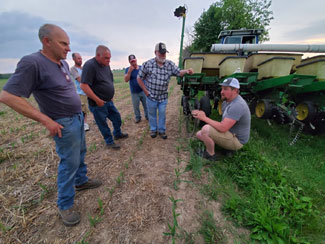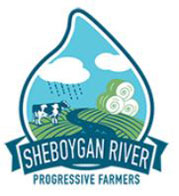
A group of conservation-minded farmers in the Sheboygan River watershed held their third annual field day this month to explore innovative farming strategies.
The farmers, part of Sheboygan River Progressive Farmers, gathered along with other local farmers and supporters June 2 at the Joe Wagner Farm in Glenbeulah, Wis.
Wagner, president of the farmer-led watershed conservation group, shared his experience with various practices on his crop farm. Topics included checking corn emergence, evaluating stand count and visiting three plant sites with varied tillage practices. The three plant sites are located on a prior soybean field with plots that include planting green into rye, no-till planting into soybeans and conventional planting.
The least emergence was on conventional tillage with a population of 29,000 to 30,000. No-till planting and planting green had an increased population of 31,000 emergence.
Wagner plans to continue to use no-till and the practice of planting into green. He uses a traditional planter that he updated and added a single disc opener for fertilizer and furrow cruisers in the past year.
“I will accept a little less yield if I can do less tillage, and it will get better as I get more years of cover crop behind me,” Wagner said.
Travis Luedke, an SRPF board member, also shared his practices. Luedke does all strip tillage on his farm.
“The mindset of when you first go into it, you are used to a field that is absolutely clean,” Luedke said. “But now we are changing our thought process and it’s really hard to be able to grasp when you take a look at it. But when we got the heavy rains, that really helped slow that water from running down. We did see a little bit of washout where we were going to plant, but it was very minimal.”
Participants at the field day also discussed the savings of implementing conservation practices, including fuel and tractor hours.
“Between that (natural soil fertility) savings and less fuel versus doing full width and full tillage across the whole field, it is definitely something that I think we are going to continue to push forward and go pretty much all strip-till and no-till and get away from full tillage,” Luedke said.
He emphasized the positive effects on soil health.
“(It is a benefit) to be able to have that root structure always constantly in the ground growing and getting that microbiology to continue that cycle of breaking down the fertility so it becomes available,” Luedke said. “And getting the worms and everything staying active so you are starting to build a lot better of a soil than what we are with just going through and flipping it all the time.”
As Wagner continues to plant cover crops, he will cut back on days of maturity on soybeans and corn. This will allow him to get the crops harvested earlier in the fall and allow more time to get the fall cover crops in the ground before winter.
SRPF continues to offer a cost-share program to its members. Farmers can apply for funds to support implementation of conservation practices, including soil testing, planting cover crops, planting green, tissue testing, manure testing, no-till and reduced tillage. This year, the group added equipment upgrades as an additional cost-share option.
Tweet about this:
Sheboygan River Progressive Farmers @srpfarmers focuses on new #conservation practices at field day https://bit.ly/3fDrXsF #sustainability #waterquality

About Sheboygan River Progressive Farmers:
Sheboygan River Progressive Farmers is a nonprofit farmer-led watershed conservation group in Sheboygan County, Wis., whose members explore farming strategies that lead to improved soil health, greater farming efficiency, sustained profitability and reduced environmental impact. Members share information gained through field trials with fellow farmers and strive to foster an understanding of the role of agriculture in the community. More information: https://srpfarmers.com


